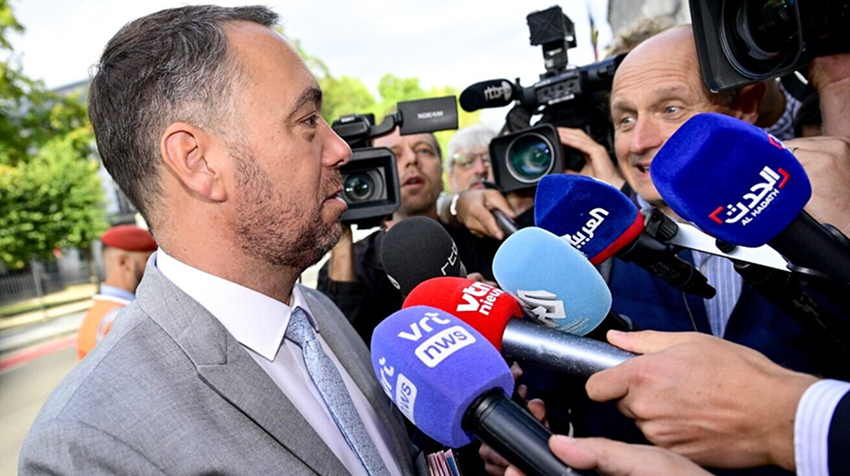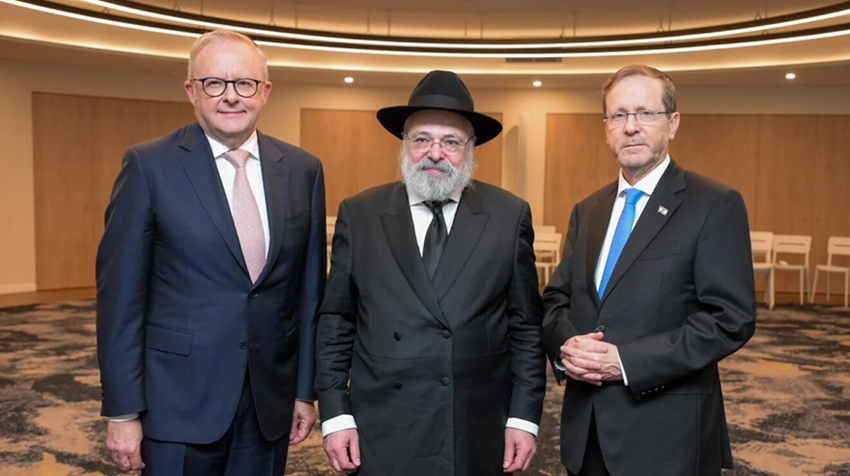Belgian Minister of Foreign Affairs Maxime Prévot talks to the press, Aug. 27, 2025. Photo by Dirk Waem/Belga/AFP via Getty Images.
Belgium’s foreign minister said on Tuesday that his country will recognize a Palestinian state at this month’s U.N. General Assembly, but only on the condition that Hamas is removed from power in the Gaza Strip and the 48 remaining hostages it holds are released.
According to Michael Freilich, a prominent politician from Belgium’s senior ruling party, despite the minister’s characterization of the country’s position on the matter, the conditions mean no such recognition will actually occur.
“Belgium will recognize Palestine during the joint initiative of France and Saudi Arabia,” Belgian Foreign Minister Maxime Prévot tweeted on Tuesday, calling the move a “powerful political and diplomatic signal.”
Prévot, a member of the Les Engagés center-left party, a junior coalition partner of Freilich’s center-right New Flemish Alliance under Prime Minister Bart de Wever, also unveiled a slate of 12 sanctions targeting the Jewish state.
Brussels had decided on the move to preserve the two-state solution and to “mark the condemnation of Israel’s expansionist ambitions, with its colonization programs and military occupations,” stated Prévot.
However, noting “the trauma suffered by the Israeli people as a result of the terror attacks by Hamas on Oct. 7, 2023,” Brussels’ top diplomat said that a royal decree that will formally recognize “Palestine” would only be signed after all captives are freed and Hamas is removed from power.
This means in effect that “unlike what was said by the foreign minister, in fact, no recognition is going to take place,” Freilich told JNS.
According to an internal Belgian Foreign Ministry document seen by JNS, while “Belgium wishes to send a strong political and diplomatic signal by joining the nations that will announce recognition of the State of Palestine,” that recognition, as well as the establishment of diplomatic relations with such a state, “will be achieved on the condition” that Hamas is “demilitarized and the renewal of the government following presidential and legislative elections, thus giving Palestine strengthened and renewed authority.”
Any Belgian policy announcement at the U.N. General Assembly in September would be based on the document, Freilich told JNS.
The language of document, issued by Prévot’s office, corresponds more closely than his tweet to the position outlined by Prime Minister De Wever, who said during a press conference on Aug. 26 that “Hamas must disappear completely” before Brussels would recognize a Palestinian state.
“There must be a credible Palestinian Authority, an agreement must be reached on borders, and Israel must receive security guarantees,” De Wever told reporters. A recognition of “Palestine” would be “pointless and counterproductive” unless these points are addressed, he added.
The 12 other measures against Israel announced by Prévot on X include a ban on imports from Jewish communities in Judea and Samaria, limits on consular aid to Belgians living in the disputed region and restrictions on government contracts with Israeli companies, as well as entry bans targeting “two extremist Israeli ministers, several violent settlers and Hamas leaders.”
Belgium will also continue to push at the European Union level for the suspension of all cooperation with Jerusalem, including the association agreement and joint research programs, Prévot stated.
Prévot claimed on X that “the point is not to sanction the Israeli people, but to ensure that its government respects international and humanitarian law and to act in the hope of improving the situation on the ground.”
France, the United Kingdom, Spain, Australia and Canada are among the Western nations that have joined plans to recognize a Palestinian state at the United Nations amid diplomatic tensions with Israel over its war on Hamas.
Israeli Prime Minister Benjamin Netanyahu in a July 25 statement condemned the French-led initiative “to recognize a Palestinian state next to Tel Aviv in the wake of the Oct. 7 massacre” by Hamas terrorists.
“Such a move rewards terror and risks creating another Iranian proxy, just as Gaza became,” Netanyahu stated. “A Palestinian state in these conditions would be a launch pad to annihilate Israel—not to live in peace beside it. Let’s be clear: the Palestinians do not seek a state alongside Israel. They seek a state instead of Israel.”
CNN cited three Israeli officials as saying on Monday that Jerusalem was considering steps in retaliation for the moves against it, including extending sovereignty over parts of Judea and Samaria.
Netanyahu held an initial discussion on sovereignty last week, but the Security Cabinet has yet to discuss the matter in detail and no decision had been made as of Monday, the three officials told CNN.
Israeli Foreign Minister Gideon Sa’ar and Strategic Affairs Minister Ron Dermer have reportedly told France, the United Kingdom and others that their moves could lead Israel to annex Judea and Samaria’s Area C and legalize outposts.
“Unilateral moves against Israel will be met with unilateral moves by Israel,” Sa’ar told his counterparts, per an Israel Hayom report in May.
Nearly 70% of Israelis want Jerusalem to extend full legal sovereignty over the disputed territory, according to a poll conducted on Jan. 29.
Source: JNS


































